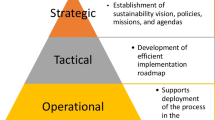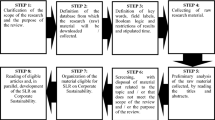Abstract
This chapter briefly summarises the development of the debate on corporate sustainability in academia and practice since the 1960s. Building on this synopsis, the edited volume is positioned within the contemporary discussions on sustainability management.
Furthermore, the chapter introduces the conceptual structure of the book chapters, the ‘Triple I’ approach, which is used to present the findings from each country in a consistent manner. The ‘Triple I’ approach constitutes a comprehensive scheme for analysing corporate sustainability, as it focuses on the companies’ intention to pursue sustainability management (i.e. motivation; issues), the integration of sustainability in the organisation (i.e. connecting sustainability to the core business; involving corporate functions; using drivers of business cases for sustainability) and the actual implementation of sustainability management measures (i.e. stakeholder management; sustainability management tools and standards; measurements).
Likewise, the chapter sets up a framework for comparing the international results, which allows positioning each country within the international context.
Lastly, the reader is provided with an overview of the edited volumes chapters and their key contributions.
Access this chapter
Tax calculation will be finalised at checkout
Purchases are for personal use only
Similar content being viewed by others
References
Babiak K, Trendafilova S (2011) CSR and environmental responsibility: motives and pressures to adopt green management practices. Corp Soc Responsib Environ Manag 18(1):11–24
Bansal P (2005) Evolving sustainably: a longitudinal study of corporate sustainable development. Strateg Manag J 26(3):197–218
Bansal P, Roth K (2000) Why companies go green: a model of ecological responsiveness. Acad Manag J 43(4):717–736
Black LD, Härtel CEJ (2004) The five capabilities of socially responsible companies. J Public Aff 4(2):125–144
Carroll AB, Buchholtz AK (2006) Business & society: ethics and stakeholder management, 6th edn. Mason, South-Western
Carroll AB, Shabana KM (2010) The business case for corporate social responsibility. A review of concepts, research and practice. Int J Manag Rev 12(1):85–105
Ditlev-Simonsen CD, Midttun A (2011) What motivates managers to pursue corporate responsibility? A survey among key stakeholders. Corp Soc Responsib Environ Manag 18(1):25–38
Dunphy D, Griffiths A, Benn S (2007) Organizational change for corporate sustainability. A guide for leaders and change agents of the future, 2nd edn. Routledge, London
Elkington J (1997) Cannibals with forks: the triple bottom line of 21st century business. Capstone, Oxford
Epstein MJ (2008) Making sustainability work. Best practices in managing and measuring corporate social, environmental, and economic impacts. Greenleaf, Sheffield
Epstein MJ, Roy M-J (2003) Making the business case for sustainability: linking social and environmental actions to financial performance. J Corp Citizen 9:79–96
Freeman RE (1984) Strategic management: a stakeholder approach. Pitman, Boston
Freeman RE (2010) Stakeholder theory: the state of the art. Cambridge University Press, Cambridge/New York
Global Reporting Initiative (GRI) (2012) G3 guidelines. https://www.globalreporting.org/reporting/reporting-framework-overview/Pages/default.aspx. Accessed 7 Jul 2013
Haanaes K, Reeves M, von Streng Velken I, Audretsch M, Kiron D, Kruschwitz N (2012) Sustainability nears a tipping point, MIT Sloan Management Review. Massachusetts Institute of Technology/Boston Consulting Group, North Hollywood
Hansen EG, Grosse-Dunker F, Reichwald R (2009) Sustainability innovation cube – a framework to evaluate sustainability-oriented innovations. Int J Innov Manag 13(4):683–713
Harting T, Harmeling SS, Venkataraman S (2006) Innovative stakeholder relations. When ethics pays (and when it doesn’t). Bus Ethics Q 16(1):43–68
Hoffman AJ (2001) Linking organizational and field-level analyses: the diffusion of corporate environmental practice. Organ Environ 14(2):133–156
Kiron D, Kruschwitz N, Haanaes K, Reeves M, Goh E (2013) The innovation bottom line. How companies that see sustainability as both a necessity and an opportunity, and change their business models in response, are finding success. Massachusetts Institute of Technology/Boston Consulting Group, Boston
Krick T, Forstater M, Monaghan P, Sillanpää M (2005) Stakeholder engagement manual, vol 2, The practitioner’s handbook on stakeholder engagement. AccountAbility, London
Lauring J, Thomsen C (2009) Collective ideals and practices in sustainable development: managing corporate identity. Corp Soc Responsib Environ Manag 16(1):38–47
Martin A, Benn S, Dunphy D (2007) Towards a model of governance for sustainability. In: Benn S, Dunphy D (eds) Corporate governance and sustainability: challenges for theory and practice. Routledge, London, pp 94–121
Moore SB, Manring SL (2009) Strategy development in small and medium sized enterprises for sustainability and increased value creation. J Clean Prod 17(2):276–282
Munda G (2008) Social multi-criteria evaluation for a sustainable economy. Springer, Berlin/Heidelberg
Ruppel CP, Harrington SJ (2000) The relationship of communication, ethical work climate, and trust to commitment and innovation. J Bus Ethics 25(4):313–328
Schaltegger S (2011) Sustainability as a driver for corporate economic success. Consequences for the development of sustainability management control. Soc Econ 33(1):15–28
Schaltegger S, Burritt R (2005) Corporate sustainability. In: Folmer H, Tietenberg T (eds) The international yearbook of environmental and resource economics. Edward Elgar, Cheltenham, pp 185–232
Schaltegger S, Lüdeke-Freund F (2012) The “business case for sustainability” concept: a short introduction. Centre for Sustainability Management, Lüneburg
Schaltegger S, Herzig C, Kleiber C, Müller J (2002) Sustainability management in business enterprises, concepts and instruments for sustainable organisation development. The Federal Ministry for the Environment, Nature Conservation and Nuclear Safety (BMU)/Federation of German Industries (BDI), Bonn/Berlin
Schaltegger S, Lüdeke-Freund F, Hansen EG (2012) Business cases for sustainability: the role of business model innovation for corporate sustainability. Int J Innov Sustain Dev 6(2):95–119
Schaltegger S, Harms D, Hörisch J, Windolph SE, Burritt R, Carter A, Truran S, Crutzen N, Ben-Rhouma A, Csutora M, Tabi A, Kokubu K, Kitada H, Haider MB, Kim J-D, Lee K-H, Moneva JM, Ortas E, Álvarez-Etxeberria I, Daub C-H, Schmidt J, Herzig C, Morelli J (2013) International corporate sustainability barometer: a comparative study of 11 countries. Centre for Sustainability Management, Lüneburg
Schaltegger S, Harms D, Windolph SE, Hörisch J (2014) Involving corporate functions: who contributes to sustainable development? Sustainability 6(5):3064–3085
Schaltegger S, Wagner M (2006) Managing the business case for sustainability. The integration of social, environmental and economic performance. Greenleaf, Sheffield
Shrivastava P (1995) The role of corporations in achieving ecological sustainability. Acad Manag Rev 20(4):936–960
Shrivastava P, Hart S (1995) Creating sustainable corporations. Bus Strateg Environ 4(3):154–165
Starik M, Kanashiro P (2013) Toward a theory of sustainability management: uncovering and integrating the nearly obvious. Organ Environ 26(1):7–30
Steger U (ed) (2004) The business of sustainability: building industry cases for corporate sustainability. Palgrave Macmillan, Houndmills
United Nations (1992) Rio declaration on environment and development 1992. United Nations Environment Programme (UNEP), New York
Weber M (2008) The business case for corporate social responsibility: a company-level measurement approach for CSR. J Environ Manag 26(4):247–261
Windolph SE, Harms D, Schaltegger S (2013) Motivations for corporate sustainability management: contrasting survey results and implementation. Corp Soc Responsib Environ Manag (online first)
World Business Council for Sustainable Development (WBCSD) (2002) The business case for sustainable development: making a difference towards the Earth Summit 2002 and beyond. Corp Environ Strateg 9(3):226–235
Author information
Authors and Affiliations
Corresponding author
Editor information
Editors and Affiliations
Rights and permissions
Copyright information
© 2014 Springer International Publishing Switzerland
About this chapter
Cite this chapter
Harms, D., Hörisch, J., Schaltegger, S., Windolph, S.E. (2014). International Corporate Sustainability Barometer: Introduction and Structure. In: Schaltegger, S., Windolph, S., Harms, D., Hörisch, J. (eds) Corporate Sustainability in International Comparison. Eco-Efficiency in Industry and Science, vol 31. Springer, Cham. https://doi.org/10.1007/978-3-319-06227-3_1
Download citation
DOI: https://doi.org/10.1007/978-3-319-06227-3_1
Published:
Publisher Name: Springer, Cham
Print ISBN: 978-3-319-06226-6
Online ISBN: 978-3-319-06227-3
eBook Packages: Earth and Environmental ScienceEarth and Environmental Science (R0)




